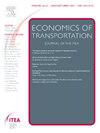Collusion prevention mechanism in PPP highway projects: Optimal government subsidy, toll and penalty
IF 1.7
3区 工程技术
Q2 ECONOMICS
引用次数: 0
Abstract
We study the collusion between the regulator and the private sector in misreporting service quality in highway projects to obtain performance-based subsidies. The impact of collusion on government subsidies and tolls is analyzed using the principal-agent model, and a mechanism to prevent collusion is devised. The analysis explores the incentive effect of government subsidies on effort in the collusion case. A mechanism for preventing collusion was presented to induce the supervision department to report truthful service information, and the effectiveness of the mechanism was analyzed. These results indicate that collusion leads to subsidies that no longer motivate efforts to improve service quality. Specific subsidies and penalties were provided as collusion prevention mechanisms. The collusion prevention mechanism effectively alleviates the ineffectiveness of subsidies, encourages the private sector to increase its efforts, reduces tolls, and improves social welfare. Social welfare is maximized when collusion penalties are imposed entirely on the private sector.
PPP公路项目合谋防范机制:政府补贴、收费和处罚的优化
我们研究了监管机构和私营部门在高速公路项目中虚假报告服务质量以获得基于绩效的补贴的勾结。运用委托代理模型分析了合谋对政府补贴和通行费的影响,并设计了防止合谋的机制。分析了合谋案中政府补贴对努力的激励作用。提出了一种防止合谋的机制,诱导监管部门如实报告服务信息,并对该机制的有效性进行了分析。这些结果表明,共谋导致补贴不再激励提高服务质量的努力。规定了具体的补贴和处罚措施,作为防止串谋的机制。合谋防范机制有效缓解了补贴的无效性,鼓励私营部门加大力度,降低了通行费,提高了社会福利水平。只有对私企进行合谋处罚,社会福利才会最大化。
本文章由计算机程序翻译,如有差异,请以英文原文为准。
求助全文
约1分钟内获得全文
求助全文

 求助内容:
求助内容: 应助结果提醒方式:
应助结果提醒方式:


